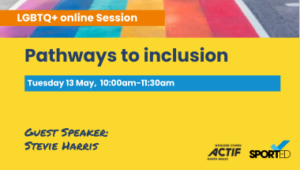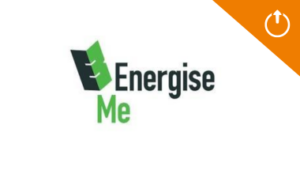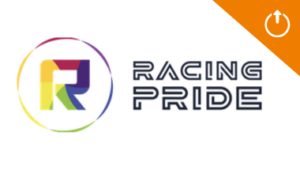Book onto this Sported webinar
Read MoreLGBT+ signposting

A UK directory of organisations committed to making active lives possible for the LGBT+ community
The Government estimates 3.9 million people or 6% of the population identify as lesbian, gay or bi in the UK. It is estimated that 650,000 people, or 1% of the population identify as trans in Great Britain. Yet, homophobic, biphobic and transphobic culture is rife within school and sport in particular. (Make Sport Everyone’s Game -Sports Toolkit, 2018)
Common negative experiences put lesbian, gay, bi and trans people off taking part in sport, or being open with others about their sexual orientation or gender identity. Surveys report that:
- 2/3 of lesbian, gay and bi school pupils say they don’t like team sports (School Report 2012)
- 41% of trans young people say they would not join a sports club (Metro Youth Chances Survey, 2014)
- 4 in 10 gay and bi men and 3 in 10 would expect homophobia if they participated in a team sport while being open about their sexual orientation (Gay in Britain, 2013)
- Gay and bi men are 4x less likely to take part in team sports than their heterosexual peers (Sport England, Active People Survey 2013)
Places to look for more information and resources
Pride Sports UK’s basic aims are to challenge homophobia in sport and improve access to sport for LGBT+ people. In working towards these goals they:
- campaign for change educate
- promote good practice and
- actively promote LGBT+ participation and satisfaction in sport
Pride Sports UK actively works with crosssector partners to ensure that LGBT+ are able to get into organised sport and new LGBT+ specific sport groups are able to get started.
Key resources:
Stonewall UK is a charity founded to enable the LGBT community to reach their full potential. They do this by empowering individuals, transforming institutions (including sports organisations), changing hearts and minds, and changing and protecting laws essential for LGBT people.
Stonewall is also the leader of Rainbow Laces movement to make sport more inclusive of the LGBT community.
Key resources:
- Make Sport Everyone’s Game – a general guide for LGBT inclusion in sport including legal responsibility
- The Employee Lifecycle – A guide to attracting, recruiting, supporting and developing diverse talent at your organisation
- Stonewall’s Sports Champions – professional sports people who are ambassadors for LGBT inclusion within Sport
- LGBTQ+ Inclusion presentation – A presentation including information about terminology, a snapshot of LGBTQ+ legislation in the UK, exploring allyship and action planning.
The Sports Council Equality Group consists of the relevant officers from all the Sports Councils (UK Sport, Sport England, Sport Scotland, Sport Wales and Sport Northern Ireland. It aims to promote and develop equality in sport across all the equality strands.
The group has developed the Equality Standard for Sport and reflects the latest equality legislation. There are 4 levels that organisations can progress through with guidance and templates.
Key resources:
- Equality Standard for Sport Guidance and templates
- UK Equality Standard Resource Pack – guidance for sports organisations
Sported Media LGBT+ is a network group and consultancy that advocates for inclusion in the media industry and across sport in general. They play various roles:
- As a consultancy they offer advice and expertise on communicating LGBT+ inclusion and related themes.
- As a network, they provide a space for LGBT+ people and allies working in sports journalism, TV production, public relations and all other sports media-related roles, to connect in person and online, in order to share experiences, advice, content ideas, and other professional support and assistance.
- As an advocacy group, they champion all those with a role in sport who are also LGBT+ – whether they are competing, participating, attending or working – at any level. They are committed to LGBT+ inclusion, the fair and accurate representation of LGBT+ people in the media, and tackling any instances of homophobia, biphobia and transphobia, all of which sadly remain far too common in sport.
Key resources:
- ‘Rainbow Ready‘: Media resources on LGBT+ inclusion in sport
LEAP Sports Scotland: LEAP is committed to breaking down the structural, social and personal barriers which prevent lesbian, gay, bisexual, transgender and intersex people across the country from accessing, participating and excelling in Scottish sports. It trains groups looking to provide LGBTI specific and friendly sports activities.
Leap Sports – Non-Binary Inclusion in Sport Booklet:
This booklet includes:
- A summary of a research workshop which took place specifically to explore non-binary inclusion in sport
- Three case studies showcasing examples of non-binary inclusion, derived from people’s lived experiences of organising and participating in sport
- Some tips for being a non-binary ally
Gendered intelligence: GI aims to increase understanding of gender diversity. Training and support on trans issues, including specialist support for young trans people aged 8 – 25 years old.
Download Gendered Intelligence resources including:
- Trans inclusion resource list for professionals
- Good practice tips for working with young trans people
Football Association: A Guide to Including Trans People in Football
Additional partners
LGBT Sports Cymru aims to support the creation of a thriving, inclusive, sporting community across Wales, where LGB&T individuals feel safe, welcome and free from discrimination. Resources for including LGB&T Young People in Sport, a Welsh LGB&T Charter and Guidance for NGBs on Transsexual People and Competitive Sport.
Mermaids Sport supports transgender, nonbinary and gender diverse children, young people and their families. They help young people find inclusive sporting opportunities, parents/guardians/carers to get young people involved in sport and schools/clubs/grassroots groups so improve trans and nonbinary inclusion in sport.
The Scottish Trans Alliance is the Equality Network project to improve gender identity and gender reassignment equality, rights and inclusion Scotland. Completed research on transphobia within sport.
The FA, which is the governing body for Football in England, has produced a guide for including Trans people in football.
The Equality Network aims to bring about equality and improve the human rights situation of lesbian, gay, bisexual, transgender and Intersex people in Scotland. It also developed the Scottish LGBT Sports Charter.
This directory is intended to be a working document of specialists that specifically support sports and physical activity organisations to become more inclusive. It does not represent an exhaustive list of specialists.
Therefore, if there is a specific community that you are looking to engage with and have not found a resource that is relevant, please get in touch with our Membership Services team at membership@sported.org.uk and we would be more than happy to explore our networks for the expertise required.
Have we missed anyone? Email membership@sported.org.uk and tell us more.
More resources on this topic
Energise Me resources
Energise me report looking at pride in our workforce and boosting participation for LGBTQ+ people
Read MoreRacing Pride resources
Racing Pride has been developed to positively promote LGBTQ+ inclusivity within the motorsport industry
Read More


